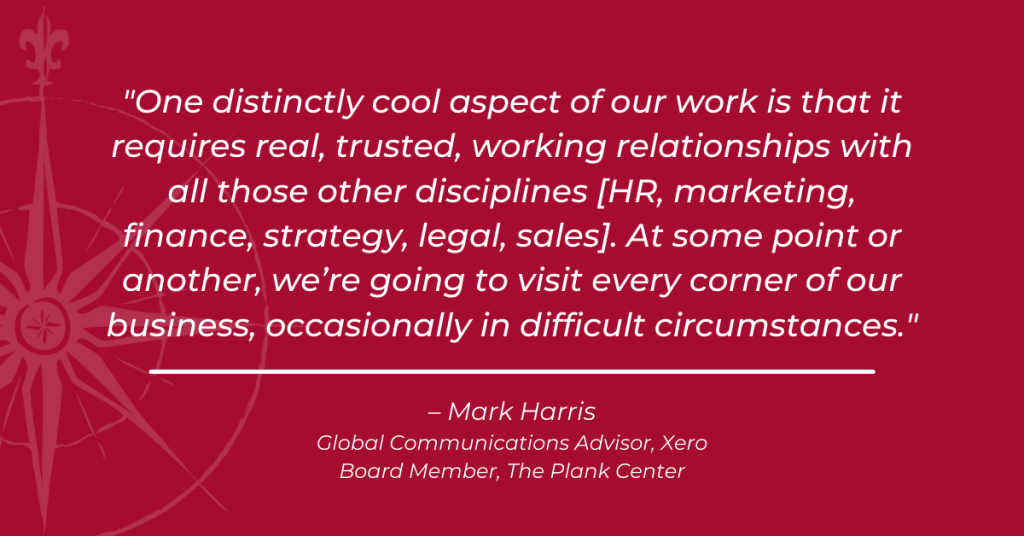By Mark Harris, Board Member, The Plank Center | April 2021
Public relations is the conscience of the business.
That statement, or some close version, is one of the accepted truths about the practice of public relations – at least among people who do PR for a living.
But what does it actually mean? Is it really as arrogant as it sounds? Is it possible to express the same idea, without automatically insulting the moral compass of HR, or marketing, finance, strategy, legal, sales and every other business function?
First, nobody believes all of any organization’s judgment, empathy, logic, wisdom and humanity miraculously landed in the PR department. Certainly nobody in PR or any other communications role believes that.
One distinctly cool aspect of our work is that it requires real, trusted, working relationships with all those other disciplines. At some point or another, we’re going to visit every corner of our business, occasionally in difficult circumstances.

So we know at a very practical level that the overwhelming majority of our colleagues and clients operate from a base of solid values and good intentions. It’s the exception when we discover we’re working with a business leader whose integrity factor could be higher.
Then how is it the case that PR can credibly assert — or accept — that it is the business function regarded as the conscience of the organization?
The explanation starts with what the PR function is distinctly accountable for. Public relations has “protect the brand” as the first line in the job description. The actual language might not be that explicit, but that’s the job, the mission and the singular responsibility of PR professionals.
Grossly oversimplified, the first line in the job description of marketing is to promote offerings, earn share and advance the brand. For finance, it’s fiduciary oversight and generate profit. Strategy has to protect the future. HR fuels the talent engine. Legal gauges risk and limits liability. Sales makes the cash register ring.
The contemporary definitions of public relations are various, and some contend the label itself — public relations – is too limited, even passe. I disagree, but that’s another conversation.
What’s not in question is that public relations professionals are primarily accountable for reputation, including the response to crisis situations.
On the proactive side, we condition markets to respond favorably to our products, services and positions on issues.
And because there is no bright line between external and internal communications, the role includes ensuring that the workforce is never surprised, and that everything that happens externally flows to employees with the transparency, context, clarity and authenticity that creates genuine advocates for the brand.
So this thought about “conscience” is really no more complex than understanding that every individual business function has a defined set of responsibilities and accountabilities, and that scope sets the appropriate orientation of that function and its leaders.
That doesn’t suggest that the leaders of finance or strategy or any other business unit don’t consider brand reputation. That’s just not their center of gravity – the thing they are evaluated on and accountable for.
So in a crisis, legal concentrates on limiting damages. Finance examines costs of remediation. Marketing and sales consider the impact on ecosystem relationships and revenue, government relations sits down with regulators, and so forth.
Each function is dealing with the situation within its own scope and specific expertise, and that’s as it should be. In that process, the PR professionals are expected to define the actions that will attempt to get the brand back to where it was before the problem occurred.
That often entails making the case to all other functions and the CEO that when a trust is broken, we always overpay to get it back.
It requires the PR advisor to detail the potential risks if the response to the crisis is insufficient.
Sometimes it means mounting the argument for when and how a brand might take a position on social issues, or why not – the so-called “right side of history,” conversation.
The PR function doesn’t hold any claim to better thinking or higher virtue.
But its advisory role demands critical thinking, judgment and the ability to analyze all the available information. Then add the empathy to anticipate the reactions of individuals and audiences, laying out implications and consequences of potential decisions such that the choices are made with open eyes.
No. Simple. Thing.
If that scope of responsibility equates to something that resembles the “conscience of the organization,” so be it. It’s not arrogant. It’s in the job description.